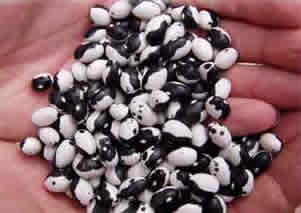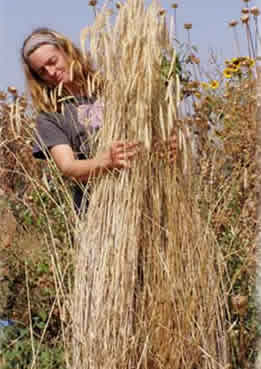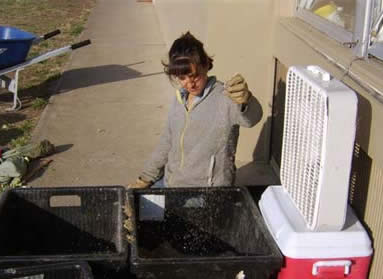Carol Deppe's August 31, 2006 email
Here Carol Deppe lets loose her remarkable knowledge, discussing some of the material Andrew and Sarah carried to Europe and Grow currently.
"...However, most of the transplants you're distributing now are a complex F2, and are very good plants to be distributing, given their potential for being foundation plants of many new and interesting varieties."
In The Cabbage Coalition, Nick describes why he is currently growing 30 varieties of winter cabbage, mostly hybrids.
"...evidence strongly suggests that the defining plant breeding motif, one that so far has put a great deal of money in people's pockets, nevertheless flies fundamentally in the face of evolutionary trends."
These thoughts were precised and rehashed as "Deconstructing Civilization With Cabbage" for the January/February 2007 issue of In Good Tilth, the Pacific Northwest's foremost sustainable agriculture publication.
In a companion piece, "The Future of Farming", Nick describes some of his insights into seed stewardship in ecological context, garnerned from his years spent wandering around gardens and farms in our bioregion. Put simply, it transpires that the most effective seed stewardship approaches are, of necessity, small-scale, highly-localized, inextricably related to the long term care of the larger ecologies in which they are embedded, and intrinsically uneconomic. Why? How? "The Future of Farming" is excerpted from a piece Nick originally posted to the local permaculture listserv in June of 2002.
"People are waking to the truth that small-scale, highly localized seed-saving efforts are whupping the dictats of the market. That's because nature's truths support a deepening sense of place - plant stewardship in ecological context, through season after season after season."
Nick penned a brief, highly concentrated synthesis of the two pieces above, titled, "Reclaiming the Stolen Harvest" for the program for Seedy Sunday, the UK's largest seed swap, which took place on February 4, 2007. It summarizes the core purpose of the Seed Ambassadors Project.
"...it is hardly surprising that the stewardship of open-pollinated food crops, following nature's designs and meeting nature's needs, is now emerging as a centerpiece of burgeoning efforts worldwide, to reclaim and restore foundational cultural values along ecologically coherent lines - in the implicit image of openness, interdependence, abundance and the regenerative power of Nature."
Nick's deepening interest in the topic of 'dehybridization' prompted a note to Carol Deppe, author of Breed Your Own Vegetable Varieties: The Gardener's and Farmer's Guide to Plant Breeding and Seed Saving ("The gardening book of the decade." - Ken Allen) and the text that has arguably done more to demystify plant breeding than any other. Carol lives locally and is a friend and collaborator. Frank Morton, a pillar of the U.S. organic breeding community, described Carol's written response to Nick's prodding for her thoughts on dehybridization strategies:
"...This is a beautiful exposition of a nimble mind working on strategies to get the best out of every selection opportunity, and to accumulate the genes you want in the final sieving of traits. This is beautiful, and would be worth having in a notebook to consult on a regular basis."
Here's the full text of Carol's reply, and Nick's email to her which prompted it, which describes his sense that a revolution in food plant breeding holds a key to a restitution of both the wisdom and means of the sound stewardship of planetary ecology.




